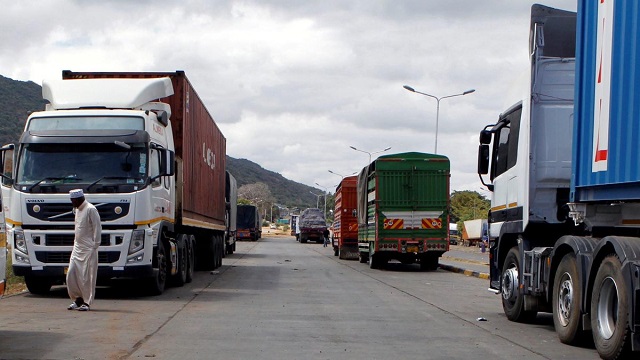
Kampala, Uganda | THE INDEPENDENT | The East Africa Community (EAC) secretariat and its partner states have unveiled a new mobile application to enable the issuance of the EAC COVID-19 digital certificates that are mutually recognised by the partner states.
The app dubbed the Regional Electronic Cargo and Driver Tracking System (RECDTS) aims to eliminate multiple testing and congestion at East Africa border crossing points.
It allows partner states to electronically share truck drivers’ COVID-19 test results, therefore minimising the need for multiple COVID-19 tests in a single trip. It also provides a surveillance system to monitor long-distance truckers crew health and enable contact tracing.
The reliance on manual certificates and delayed test results at the borders has been reported as one of the main reasons of long delays at border points, such as those witnessed in Busia, Malaba, Nimule and Elegu. Some of the delays have caused tailbacks of trucks measuring tens of kilometres in some cases.
The development of the app with funding from European Union, Global Affairs-Canada, Danida, Finland, Netherlands and United Kingdom through TradeMark East Africa was in accordance with the directive given by the 1st joint ministerial meeting of EAC ministers responsible for health and EAC affairs.
It is expected that the platform will contribute to protecting lives, promoting safe trade through continuous flow, support health-related protocols. The app will be in use in all partner states and will eventually be extended to EAC neighbouring countries, particularly Democratic Republic of Congo (DRC).
The chair of the EAC Council of Ministers Prof Nshuti Manasseh said the effective implementation of Electronic Cargo and Driver Tracking System is critical to trade facilitation in the region as well as the recovery of regional economies, whose supply chain rotates around truck drivers.
Speaking at the rollout, the EU ambassador to Kenya Simon Mordue observed that the common approach to tackling the threat of coronavirus to the East African Community’s economy is paramount, adding that the new platform is an example of a solution which enables the region to work together in stemming the spread of the virus across borders.
Ambassador Morude also noted that the platform will provide an efficient, transparent and accessible way to support formal trade across the EAC borders and sustainability of EAC economies, “now and in the near future.”
The EAC Deputy Secretary-General in charge of productive and social sector Christophe Bazivamo commended the progress in the development of the Electronic Cargo and Driver Tracking System remarking, “today’s rollout proves that coordinated action at the regional and even continental level is possible especially as we start the implementation of the Africa Continental Free Trade Area. This kind of coordination is evidence that we can regulate the flow of trade, safeguard livelihoods and achieve competition and quality.”
Frank Matsaert the Chief Executive Officer of Trade Mark East Africa said that the current pandemic has in many ways revealed how crucial the facilitation of trade is in times of crisis. It shows us that trade must become more fluid so that producers are able to access markets.
The task of ensuring that imported goods reach consumers lies in the hands of truck drivers and as the coronavirus spread in the region, the transit corridors were identified as conduits for the spread of infections. In efforts to contain the spread of COVID-19, the health authorities developed protocols requiring truck drivers to be tested.
The Regional Electronic Cargo and Driver Tracking System will resolve some of the challenges that were being experienced in the execution of health protocols including multiple testing of truck drivers at the border crossing, documentary fraud, and conflicting test results.
The system is expected to be in use in all the EAC partner states – Burundi, Kenya, Rwanda, South Sudan, Tanzania, and Uganda – and extended to EAC neighbouring countries particularly the Democratic Republic of Congo (DRC).
*****
URN
 The Independent Uganda: You get the Truth we Pay the Price
The Independent Uganda: You get the Truth we Pay the Price





